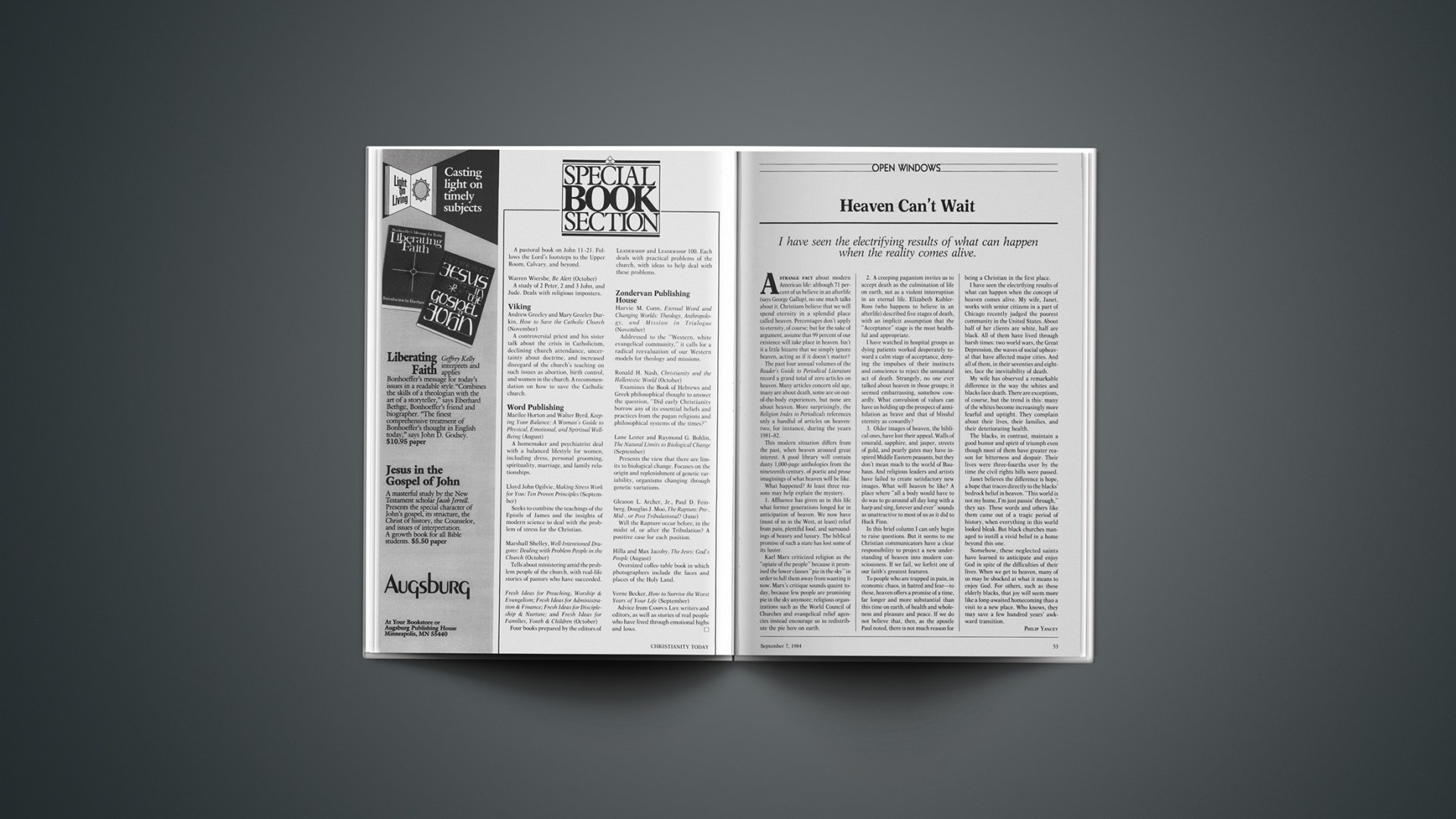A strange fact about modern American life: although 71 percent of us believe in an afterlife (says George Gallup), no one much talks about it. Christians believe that we will spend eternity in a splendid place called heaven. Percentages don’t apply to eternity, of course; but for the sake of argument, assume that 99 percent of our existence will take place in heaven. Isn’t it a little bizarre that we simply ignore heaven, acting as if it doesn’t matter?
The past four annual volumes of the Reader’s Guide to Periodical Literature record a grand total of zero articles on heaven. Many articles concern old age, many are about death, some are on out-of-the-body experiences, but none are about heaven. More surprisingly, the Religion Index to Periodicals references only a handful of articles on heaven: two, for instance, during the years 1981–82.
This modern situation differs from the past, when heaven aroused great interest. A good library will contain dusty 1,000-page anthologies from the nineteenth century, of poetic and prose imaginings of what heaven will be like.
What happened? At least three reasons may help explain the mystery.
1. Affluence has given us in this life what former generations longed for in anticipation of heaven. We now have (most of us in the West, at least) relief from pain, plentiful food, and surroundings of beauty and luxury. The biblical promise of such a state has lost some of its luster.
Karl Marx criticized religion as the “opiate of the people” because it promised the lower classes “pie in the sky” in order to lull them away from wanting it now. Marx’s critique sounds quaint today, because few people are promising pie in the sky anymore; religious organizations such as the World Council of Churches and evangelical relief agencies instead encourage us to redistribute the pie here on earth.
2. A creeping paganism invites us to accept death as the culmination of life on earth, not as a violent interruption in an eternal life. Elizabeth Kubler-Ross (who happens to believe in an afterlife) described five stages of death, with an implicit assumption that the “Acceptance” stage is the most healthful and appropriate.
I have watched in hospital groups as dying patients worked desperately toward a calm stage of acceptance, denying the impulses of their instincts and conscience to reject the unnatural act of death. Strangely, no one ever talked about heaven in those groups; it seemed embarrassing, somehow cowardly. What convulsion of values can have us holding up the prospect of annihilation as brave and that of blissful eternity as cowardly?
3. Older images of heaven, the biblical ones, have lost their appeal. Walls of emerald, sapphire, and jasper, streets of gold, and pearly gates may have inspired Middle Eastern peasants, but they don’t mean much to the world of Bauhaus. And religious leaders and artists have failed to create satisfactory new images. What will heaven be like? A place where “all a body would have to do was to go around all day long with a harp and sing, forever and ever” sounds as unattractive to most of us as it did to Huck Finn.
In this brief column I can only begin to raise questions. But it seems to me Christian communicators have a clear responsibility to project a new understanding of heaven into modern consciousness. If we fail, we forfeit one of our faith’s greatest features.
To people who are trapped in pain, in economic chaos, in hatred and fear—to these, heaven offers a promise of a time, far longer and more substantial than this time on earth, of health and wholeness and pleasure and peace. If we do not believe that, then, as the apostle Paul noted, there is not much reason for being a Christian in the first place.
I have seen the electrifying results of what can happen when the concept of heaven comes alive. My wife, Janet, works with senior citizens in a part of Chicago recently judged the poorest community in the United States. About half of her clients are white, half are black. All of them have lived through harsh times: two world wars, the Great Depression, the waves of social upheaval that have affected major cities. And all of them, in their seventies and eighties, face the inevitability of death.
My wife has observed a remarkable difference in the way the whites and blacks face death. There are exceptions, of course, but the trend is this: many of the whites become increasingly more fearful and uptight. They complain about their lives, their families, and their deteriorating health.
The blacks, in contrast, maintain a good humor and spirit of triumph even though most of them have greater reason for bitterness and despair. Their lives were three-fourths over by the time the civil rights bills were passed.
Janet believes the difference is hope, a hope that traces directly to the blacks’ bedrock belief in heaven. “This world is not my home, I’m just passin’ through,” they say. These words and others like them came out of a tragic period of history, when everything in this world looked bleak. But black churches managed to instill a vivid belief in a home beyond this one.
Somehow, these neglected saints have learned to anticipate and enjoy God in spite of the difficulties of their lives. When we get to heaven, many of us may be shocked at what it means to enjoy God. For others, such as these elderly blacks, that joy will seem more like a long-awaited homecoming than a visit to a new place. Who knows, they may save a few hundred years’ awkward transition.










